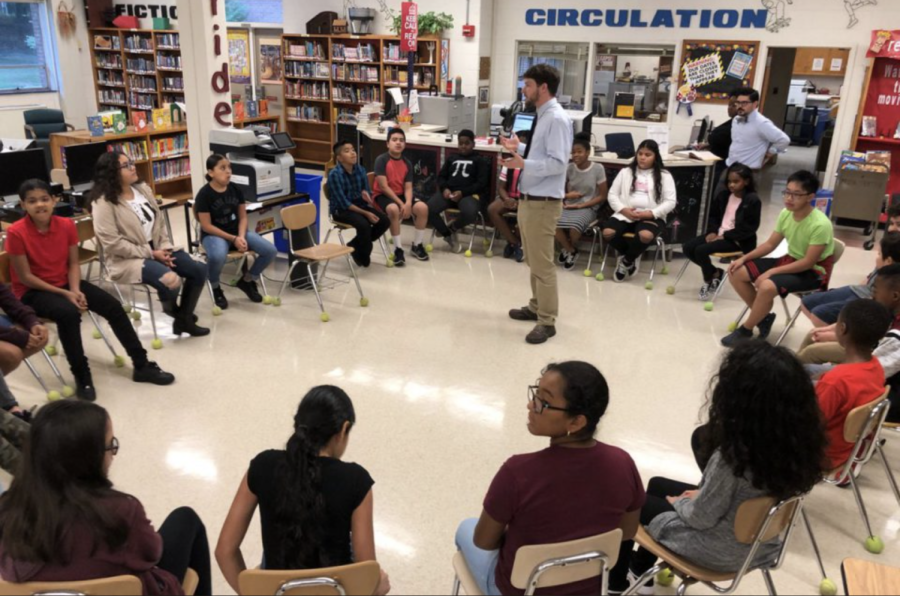Restorative justice mediates conflict, one talk at a time
Restorative justice is known for its restorative circles where the two parties in a conflict come together to discuss what happened and how to move forward.
June 6, 2023
Detention. Grade reduction. Suspension. These are decades-old punishments commonly used in schools to keep students in check, but they have gradually faded. Instead, many school systems, including MCPS, have moved over the past few years toward a more holistic approach to crime and punishment: restorative practices (RP).
According to the International Institute for Restorative Practices, RP is a “field within the social sciences that studies how to strengthen relationships between individuals as well as social connections within communities.” These practices aim to prevent tension as well as provide guidelines for how to mediate a conflict between two individuals. A subset of RP, and perhaps the most well-known of the practices, is restorative justice (RJ).
“Restorative justice is a process by which parties work together when harm has occurred to determine the harmful impact of a particular incident or series of incidents and then determine what can be done to repair that harm while holding the party who caused the harm accountable,” Brandy McDonald-Nestor, the WCHS Staff Development Teacher and Restorative Justice Coach, said.
RJ has been a state-level expectation since 2019 when Md. Education Article §7-427.1 “Trauma-Informed Approach,” which requires the use of trauma-informed approaches in schools, was passed. After the enactment of Article §7-427.1, the Maryland State Department of Education (MSDE) released guidelines to evaluate the effectiveness of this approach and whether or not its implementation was working. With 210 schools across MCPS, successfully carrying out RJ at each one of them in a synchronized manner was a daunting task.
“MCPS is moving forward with assessing the current landscape of implementation [of RJ] through both quantitative and qualitative data throughout the course of the second semester,” Dr. Monifa McKnight, the MCPS Superintendent, said in a memorandum to the members of the Board of Education on Feb. 7, 2023. “From this data, a district-level implementation assessment can be made. Then the next level of work for 2023-2024 will be school-specific enhancements and the decrease of variance across all schools.”
While MCPS is currently collecting this data, many protocols have already been implemented to ensure RP and RJ are working similarly in all schools. Each school was assigned an RJ coach for the 2022-2023 school year that “facilitates professional learning with staff and students.”
“The county provides training to school-based Restorative Justice Coaches on a monthly and ad hoc basis as needed,” McDonald-Nestor said. “There are Restorative Justice experts employed by the school system who work with us if we have a particularly challenging situation and will come in and provide training around specific practices.”
However, despite the Maryland and MCPS push for RJ, the policy has faced a lot of backlash from students and parents around the county. The program has been called too “vague” and “ineffective.”
“I think the main contributor to the backlash is a lack of understanding of what restorative justice is,” Patrick Bilock, WCHS Assistant Principal and the Principal Intern said. “A very common misconception is that restorative justice practices eliminate consequences and accountability, which is not true. Within school, disciplinary responses are assigned in alignment with the MCPS Student Code of Conduct. Restorative practices are also utilized for reflection and a way to repair the harm that was caused.”
Establishing a welcoming and inclusive environment is one of MCPS’s primary goals and the Board has been brainstorming different ways of accomplishing this goal, particularly after the results of the anti-racist audit were released. Many argue that RJ and RP are productive ways to help reach that objective.
“The most important part about RJ and RP is that they’re trying to create strategies and tactics to develop a healthier climate and culture overall,” Carla Morris, the current chair of the Montgomery County Council of PTA’s diversity, equity, and inclusion committee, said. “Anyone who is involved in culture creation, which obviously schools are, should try to make these environments more supportive, including, and welcoming; all things we want them to be. RJ and RP, when implemented well, are a great way to help establish this environment.”
WCHS has seen the implementation of these values in the past couple of years with numerous dialogues and lessons conducted in and out of classrooms.
“Restorative justice is not a program. It is more of a mindset,” Dr. Erika Mbachu, WCHS Assistant Principal, said. “We have implemented many key elements of restorative justice in our school culture. Some of the elements include community building activities in the classroom, school-wide community circles, restorative conversation lessons in PRIDE that focus on recognizing harmful behaviors and navigating difficult situations…It is becoming a norm within our school culture.”
In the coming years, MCPS and WCHS will see a rapid change and growth of RJ and RP implementation to better and more effectively create a comfortable environment for all students, teachers and staff members.
“The goal of restorative justice, just like any other practice or policy within the school and school system, is to work to match the best course of action with the exact situation,” Bilock said. “The question when planning a restorative approach is to determine what each individual needs and would benefit from so that they are able to grow and move forward.”



